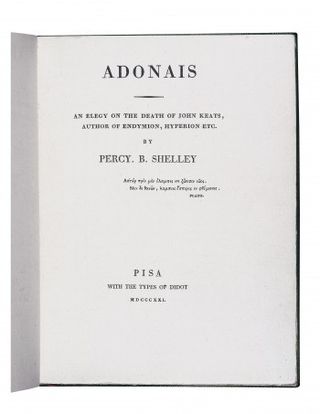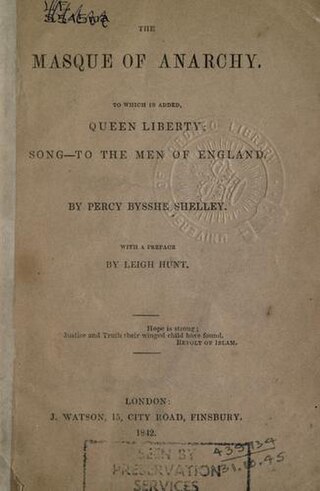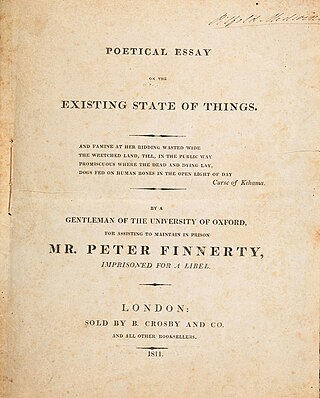This article contains information about the literary events and publications of 1819.

Benjamin Obadiah Iqbal Zephaniah was a British writer, dub poet, actor, musician and professor of poetry and creative writing. He was included in The Times list of Britain's top 50 post-war writers in 2008. In his work, Zephaniah drew on his lived experiences of incarceration, racism and his Jamaican heritage.

"Ode to the West Wind" is an ode, written by Percy Bysshe Shelley in 1819 in Cascine wood near Florence, Italy. It was originally published in 1820 by Charles Ollier in London as part of the collection Prometheus Unbound, A Lyrical Drama in Four Acts, With Other Poems. Perhaps more than anything else, Shelley wanted his message of reform and revolution spread, and the wind becomes the trope for spreading the word of change through the poet-prophet figure. Some also believe that the poem was written in response to the loss of his son, William in 1819. The ensuing pain influenced Shelley. The poem allegorises the role of the poet as the voice of change and revolution. At the time of composing this poem, Shelley without doubt had the Peterloo Massacre of August 1819 in mind. His other poems written at the same time—"The Masque of Anarchy", Prometheus Unbound, and "England in 1819"—take up these same themes of political change, revolution, and role of the poet.

Adonais: An Elegy on the Death of John Keats, Author of Endymion, Hyperion, etc. is a pastoral elegy written by Percy Bysshe Shelley for John Keats in 1821, and widely regarded as one of Shelley's best and best-known works. The poem, which is in 495 lines in 55 Spenserian stanzas, was composed in the spring of 1821 immediately after 11 April, when Shelley heard of Keats' death. It is a pastoral elegy, in the English tradition of John Milton's Lycidas. Shelley had studied and translated classical elegies. The title of the poem is modelled on ancient works, such as Achilleis, an epic poem by the 1st-century AD Roman poet Statius, and refers to the untimely death of the Greek Adonis, a god of fertility. Some critics suggest that Shelley used Virgil's tenth Eclogue, in praise of Cornelius Gallus, as a model.

The Masque of Anarchy is a British political poem written in 1819 by Percy Bysshe Shelley following the Peterloo Massacre of that year. In his call for freedom, it is perhaps the first modern statement of the principle of nonviolent resistance.
Nationality words link to articles with information on the nation's poetry or literature.
Nationality words link to articles with information on the nation's poetry or literature.
Nationality words link to articles with information on the nation's poetry or literature.
"England in 1819" is a political sonnet by the English Romantic poet Percy Bysshe Shelley which reflects his liberal ideals.

Mont Blanc: Lines Written in the Vale of Chamouni is an ode by the Romantic poet Percy Bysshe Shelley. The poem was composed between 22 July and 29 August 1816 during Shelley's journey to the Chamonix Valley, and intended to reflect the scenery through which he travelled. "Mont Blanc" was first published in 1817 in Percy Shelley and Mary Shelley's History of a Six Weeks' Tour through a Part of France, Switzerland, Germany and Holland, which some scholars believe to use "Mont Blanc" as its culmination.

Percy Bysshe Shelley was a British writer who is considered one of the major English Romantic poets. A radical in his poetry as well as in his political and social views, Shelley did not achieve fame during his lifetime, but recognition of his achievements in poetry grew steadily following his death, and he became an important influence on subsequent generations of poets, including Robert Browning, Algernon Charles Swinburne, Thomas Hardy, and W. B. Yeats. American literary critic Harold Bloom describes him as "a superb craftsman, a lyric poet without rival, and surely one of the most advanced sceptical intellects ever to write a poem."

Mary Wollstonecraft Shelley was an English novelist who is best known for writing the Gothic novel Frankenstein; or, The Modern Prometheus (1818), which is considered an early example of science fiction. She also edited and promoted the works of her husband, the Romantic poet and philosopher Percy Bysshe Shelley. Her father was the political philosopher William Godwin and her mother was the philosopher and women's rights advocate Mary Wollstonecraft.

Posthumous Fragments of Margaret Nicholson was a collection of poetry published in November, 1810 by Percy Bysshe Shelley and his friend Thomas Jefferson Hogg while they were students at Oxford University. The pamphlet was subtitled: "Being Poems found amongst the Papers of that Noted Female who attempted the Life of the King in 1786. Edited by John Fitzvictor." The pamphlet was published by John Munday and Henry Slatter in Oxford and consisted of fictional fragments that were in the nature of a hoax and prank or burlesque.

A Philosophical View of Reform is a major prose work by Percy Bysshe Shelley written in 1819-20 and first published in 1920 by Oxford University Press. The political essay is Shelley's longest prose work.

"The Cloud" is a major 1820 poem written by Percy Bysshe Shelley. "The Cloud" was written during late 1819 or early 1820, and submitted for publication on 12 July 1820. The work was published in the 1820 collection Prometheus Unbound, A Lyrical Drama, in Four Acts, With Other Poems by Charles and James Ollier in London in August 1820. The work was proof-read by John Gisborne. There were multiple drafts of the poem. The poem consists of six stanzas in anapestic or antidactylus meter, a foot with two unaccented syllables followed by an accented syllable.
The theme of poet as legislator reached its peak in the Romantic era, epitomised in Shelley's view of poets as the 'unacknowledged legislators of the world'.

We Are Many is a documentary film about the February 2003 global day of protest against the Iraq War, directed by Amir Amirani. Social movement researchers have described the 15 February protest as "the largest protest event in human history." Tony Blair's ally Lord Falconer says the anti-war march did change things:

Romanticism was an artistic, literary, and intellectual movement that originated in Europe toward the end of the 18th century. Scholars regard the publishing of William Wordsworth's and Samuel Coleridge's Lyrical Ballads in 1798 as probably the beginning of the movement in England, and the crowning of Queen Victoria in 1837 as its end. Romanticism arrived in other parts of the English-speaking world later; in the United States, it arrived around 1820.
Tony Walsh, also known as Longfella, is an English poet, performer and writer.

"Poetical Essay on the Existing State of Things" is an essay by Percy Bysshe Shelley published in 1811. The work was lost since its first appearance until a copy was found in 2006 and made available by the Bodleian Library in 2015. The anti-war and anti-imperialist work was intended to raise money for the radical Irish journalist Peter Finnerty, who had been imprisoned for libeling the Anglo-Irish politician Robert Stewart, Viscount Castlereagh, whom he accused of mistreating United Irish prisoners. The work is a precursor to The Masque of Anarchy and "England in 1819".













